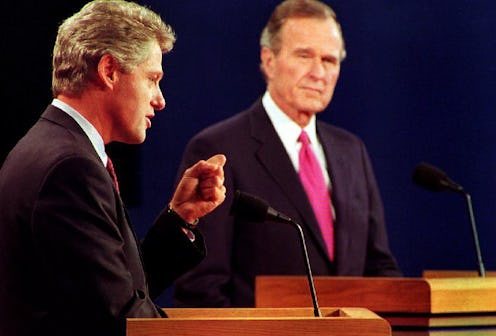News
What Hillary & Jeb Can Learn From The 1992 Debates
It's early on in the 2016 presidential season, no doubt, so it might be too early to start making predictions. But this much seems abundantly clear: Hillary Clinton is in prime position to win the Democratic nomination, and Jeb Bush has as good a shot as anybody to emerge from a crowded Republican field. In short, there's a non-negligible chance we could be looking at a 1992 redux — Bush vs. Clinton — albeit under very different circumstances. Might there be any lessons for Jeb and Hillary from the 1992 debates?
Obviously, politics have changed some since then, both in terms of the prevailing attitudes of the time, and what kind of person the electorate wants as a leader. But there are often valuable things to learn from the past, and in the event of a rematch between two of America's competing political families, the search for comparison points is a little too intriguing to pass up.
There were three presidential debates in 1992, between then-Arkansas Governor Bill Clinton, President George H.W. Bush, and Texas businessman Ross Perot. Here are 3 lessons Hillary and Jeb could draw, since they could very well end up on the same stage next fall.
Sometimes You Need To Take Risks
Incumbency is a powerful force in modern American politics, but it does carry some costs — sometimes you might take a more passive tact, when you're really flagging and need to shake things up. I'm sure most Democrats remember this feeling in 2012, after the first debate between President Obama and Mitt Romney. Obama appeared a bit detached, muted and nonchalant, an impression that cost him noticeably in the polls in the days following.
Well, that also happened to George H.W. Bush in 1992. Faced with a highly unusual race, by virtue of Perot's remarkably successful independent bid, Bush was critiqued for playing it too safe in his debates. There's no incumbent this time, so both sides will have the advantage of no realized presidential experience to pick apart, but voter apathy can set in sometimes regardless. If you're starting to flatline in the polls, and time is running short, sometimes you need to get a little aggressive — be more willing to lose because of a mistake than to lose because you didn't try something. In Bush's case, he managed a second-place finish, losing by six percent, badly atrophied by Perot's involvement.
Your Family Might Enter The Conversation
With their brother and husband respectively having been two-term presidents, both Jeb and Hillary surely understand that there's some family baggage they're carrying around. In a way, this might be why they'd be most comfortable campaigning against one another — everybody knows they might have a family member thrown in their face on national television, rightly or wrongly.
But even if they didn't know it, the 1992 debates could've demonstrated just such a moment. After attacking Bill Clinton's "character" and "judgement" for his anti-Vietnam war organizing, as CNN notes, Clinton responded by invoking Bush's father, former Connecticut Senator Prescott Bush.
... when Joe McCarthy went around this country attacking people's patriotism he was wrong. He was wrong. And a senator from Connecticut stood up to him named Prescott Bush. Your father was right to stand up to Joe McCarthy, you were wrong to attack my patriotism. I was opposed to the war but I loved my country and we need a president who will bring this country together, not divide it. We've had enough division. I want to lead a unified country.
Sometimes It's About How You Answer, Not What You Answer
In the third and final presidential debate in 1992, Clinton scored what would undeniably be his best debate moment. After Perot and Bush staggered through answers to a woman's question about how the national debt impacted their lives, Clinton stepped in and stole the show.
He showed characteristic political skill, leveraging a familiar charisma in describing his relationships with Arkansas business owners, and the pain of layoffs and unemployment. This was as pivotal and memorable a moment as the 1992 debates produced, because it verified what everyone's core, stereotypical assumptions about the candidates — the communicative, engaging Clinton and the out-of-touch sitting President.
It's a lesson that either Jeb or Hillary would do well to learn from. Bill Clinton was (and remains) a virtuoso public speaker, with a keen sense of how to appeal to a crowd from moment to moment, and not everyone is bound to be so talented. But in a campaign, as in a debate, it can sometimes be more about how you relate to people than the minutiae of your ideas.
Images: Getty Images (3)
